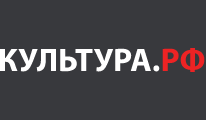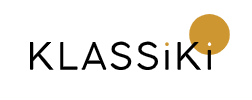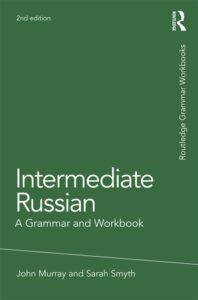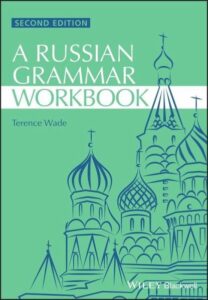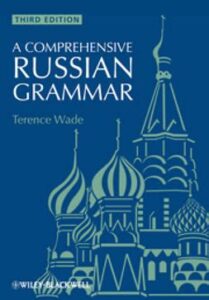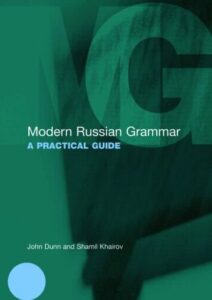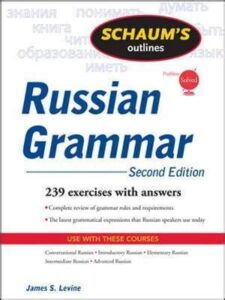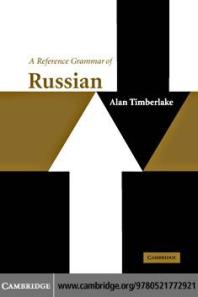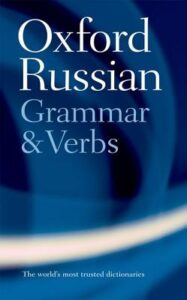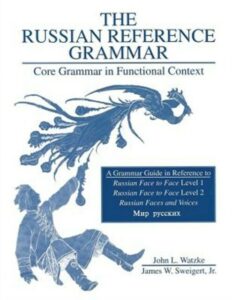Russian Language Resources
This page collects resources for learners of the Russian language, focusing on materials available through UNC Libraries and on free, open-access materials. Many paid resources exist for learners of Russian, from commercial language courses to Russian TV shows on Netflix: those are not listed here.
Streaming Films and Videos
While they barely scratch the surface of Russian cinematic output, these are recommended non-pirated resources. Beginners can watch many of these films with English subtitles. It is recommended that intermediate students watch with Russian subtitles whenever available.
Artdoc.Media
A large archive of Russian and Soviet documentary films, including those screened at the ArtdocFest documentary festival held in Russia and Latvia. No English subtitles. An even larger selection of films is available from the archive for a fee.
Mosfilm
A large selection of classic Soviet (and some post-Soviet) feature films produced at the Mosfilm studio (some in HD). English subtitles available for a smaller selection of films.
Odesa Film Studio
Official YouTube channel of the Odesa Film Studio offering feature films and animation from independent Ukraine as well as the Soviet period, typically in HD quality. Films are in Russian and Ukrainian. Some films have English subtitles.
Отечественная документалистика
YouTube channel featuring a large selection of Russian and Soviet documentary films. No English subtitles.
Пилигрим
Portal for Russian independent documentaries, shorts and some feature films. English subtitles available for some films.
Official YouTube channel of the famous animation studio Soyuzmultfilm, with classic Soviet era cartoons and contemporary shows.
Klassiki is an online cinema from Russia, the Caucasus, Central Asia and beyond that hosts a highly curated permanent collection of 60+ films that represent the best of classic filmmaking from Russia and the region.
.
Podcasts
Talk radio and podcasts are great ways to immerse yourself in the language. Try picking shows about topics you are interested in, and perhaps already familiar with. For example, it might be interesting to listen to a podcast about American politics, history, or culture, both because you will already have a lot of context for the content, and because a Russian perspective on your own country might be illuminating.
The Tech Center’s Podcast Indexing and Discovery System provides a way for teachers and students to find and listen to authentic podcasts in Russian on topics they are interested in. The system retrieves podcasts from a curated set that was collected using a discovery method developed in the Tech Center.
Meduza, a Russian-language media outlet based in Latvia, offers excellent podcasts on a variety of topics, from current events, to film and TV shows, music, finance, health, parenting, and even the Russian language and linguistics.
Since Медуза was declared a foreign agent at the end of April, most of their excellent podcasts migrated to a new platform Техника речи: https://tehnikarechi.studio/. Медуза did retain its daily news podcast.
Подкасты на русском offers a sizeable catalog of Russian language podcasts, browsable by category.
Радио Arzamas presents audio lectures, courses, and podcasts on history, art, literature, and anthropology from the eponymous public humanities project.
Radio Liberty‘s long-running podcast series, featuring some by now classic émigré radio personalities.
Эхо Москвы is a cult Moscow talk radio station, known especially for providing a forum for various opposition voices that are otherwise barred from mainstream media.
Ракета is podcast aimed at beginner-level learners offering short first person narratives about everyday life using simpler vocabulary and delivered at slower speeds. Each episode comes with a transcript.
.
Lessons, tutorials, other learning resources
The Russian grammar channel offers short explanations of essential grammar points by UNC alum Dr. Curtis Ford.
Live Fluent offers learning resources on verbs, cases, pronunciation, spelling, and finer points of Russian grammar, compiled by learners for learners.
Rockin’ Russian, a University of Texas project, offers a fun if somewhat dated tool for engaging with popular Russian song lyrics (the videos labeled “modern” are, perhaps, “retro” now, while those labeled “retro” are, perhaps, “classic”).
Poetry Reader for Russian Learners, a Yale University project, is a collection of classic Russian poetry with audio and sets of grammar and comprehension exercises around each poem.
Real Life in Russia, a project from Michigan State University, offers a series of lessons to prepare you for everyday situations that you will encounter soon after arriving in Russia. It does include some exercises related to language, but most of the exercises are centered around the cultural and the practical.
SMARTool for English-speaking learners of Russian, linguist-built, corpus-based tool for learning the most frequent forms of 3,000 basic vocabulary items.
UGA’s Culture App is designed to help Russian Flagship students prepare for different scenarios in the Russian-speaking world.
Textbooks for self-study
The following textbooks are included here because they are currently available as ebooks through the University Library. More textbooks are available through the Library in print, more still exist on the market. Different textbooks fit with different learning styles, while for many learners, a textbook may not the best tool at all.
Keep in mind that an older textbook does not imply poorer quality, and older titles can have very valuable explanations, even though vocabulary, examples, and texts may seem dated and jarring (some are unfortunately more sexist as well). Charles Townsend’s 1970 Continuing with Russian is a great example of first-notch grammatical explanations amidst the dated Soviet context of the readings and exercises.
Try a textbook to see if it is a good fit!
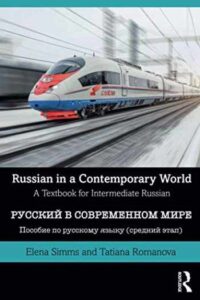 Simms, Elena, and Tatiana Romanova. Russian in a Contemporary World: A Textbook for Intermediate Russian = Russkiĭ V Sovremennom Mire : Posobie Po Russkomu I︠a︡zyku (Sredniĭ Ėtap). New York : Routledge, 2019. Ebook!
Simms, Elena, and Tatiana Romanova. Russian in a Contemporary World: A Textbook for Intermediate Russian = Russkiĭ V Sovremennom Mire : Posobie Po Russkomu I︠a︡zyku (Sredniĭ Ėtap). New York : Routledge, 2019. Ebook!
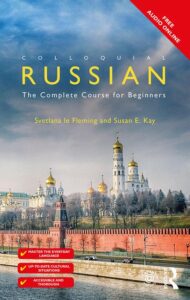 Le Fleming, Svetlana, and Susan, E. Kay. Colloquial Russian: The Complete Course For Beginners. London: Routledge, 2017. Ebook!
Le Fleming, Svetlana, and Susan, E. Kay. Colloquial Russian: The Complete Course For Beginners. London: Routledge, 2017. Ebook!
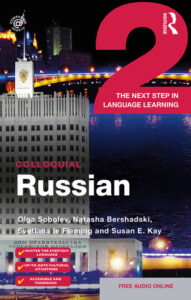 Soboleva, Olga, Natasha Bershadski, Svetlana Le Fleming, and Susan E. Kay. Colloquial Russian 2. The Next Step in Language Learning. London: Routledge, 2019. Ebook!
Soboleva, Olga, Natasha Bershadski, Svetlana Le Fleming, and Susan E. Kay. Colloquial Russian 2. The Next Step in Language Learning. London: Routledge, 2019. Ebook!
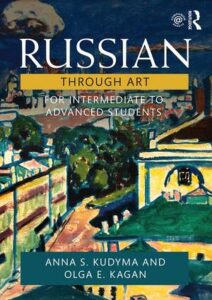 Kagan, Olga, and Anna Kudyma. Russian Through Art: For Intermediate to Advanced Students. London: Routledge: 2019. Ebook!
Kagan, Olga, and Anna Kudyma. Russian Through Art: For Intermediate to Advanced Students. London: Routledge: 2019. Ebook!
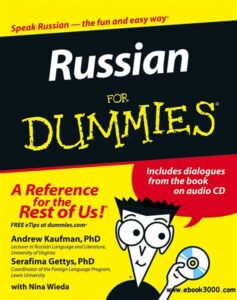 Kaufman, Andrew, and Serafima Gettis. Russian for Dummies. Hoboken, N.J.: Wiley, 2006. Ebook!
Kaufman, Andrew, and Serafima Gettis. Russian for Dummies. Hoboken, N.J.: Wiley, 2006. Ebook!
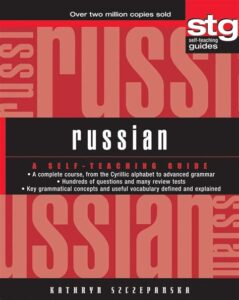 Szczepanska, Kathryn. Russian: A Self-Teaching Guide. Hoboken, N.J.: Wiley, 2005. Ebook!
Szczepanska, Kathryn. Russian: A Self-Teaching Guide. Hoboken, N.J.: Wiley, 2005. Ebook!
.
Online dictionaries
GoogleTranslate gets better all the time, but it is still inferior to a good dictionary, and can still be poor at translating phrases (try the Google Document Translate function for a much better performance). Below are some useful alternatives.
ABBYY Lingvo Dictionary is an excellent Russian-English/English-Russian dictionary that lets you hear the pronunciation and see the word or phrase in contexts drawn from a corpus of Russian and translated literature.
ReversoContext dictionary is a fascinating tool that draws on previously translated texts on the web to show you how a particular word or phrase has been used in context.
Slovari.ru allows you to search across a set of classic Russian dictionaries, popular and specialized, from Ozhegov and Shvedova’s standard dictionary, to Vinogradov’s dictionary of Pushkin’s language, to Elistratov’s dictionary of Russian argot.
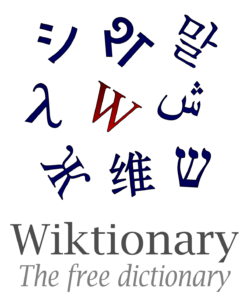 Wiktionary is a very handy way to check verbs conjugations and noun and adjective declensions, as well as certain other grammatical features of words. Content is crowdsourced.
Wiktionary is a very handy way to check verbs conjugations and noun and adjective declensions, as well as certain other grammatical features of words. Content is crowdsourced.
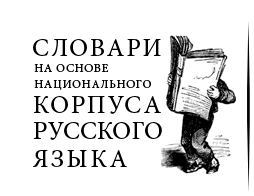 New Frequency Dictionary of the Russian Language is a neat way to check where your vocabulary knowledge is. Do you know (and can you correctly use) the most common adverbs? Can you conjugate the most frequently used verbs?
New Frequency Dictionary of the Russian Language is a neat way to check where your vocabulary knowledge is. Do you know (and can you correctly use) the most common adverbs? Can you conjugate the most frequently used verbs?
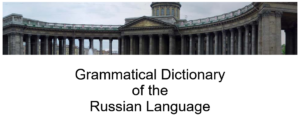 Maksimova, E. A. and I.G. Guliakova. Russian Grammatical Dictionary. SEELRC, https://seelrc-iis.trinity.duke.edu/russdict/index.aspx.
Maksimova, E. A. and I.G. Guliakova. Russian Grammatical Dictionary. SEELRC, https://seelrc-iis.trinity.duke.edu/russdict/index.aspx.
.
Reference grammar
A good reference grammar will not only give you the correct endings, provide rules, and explain the patterns and exceptions you may encounter, but give you insight into how the language works as a complete system of communication. Several of the grammars below are available electronically.
While not a reference grammar per se, Gramota.ru is the premier source on Russian grammar, usage, spelling, and punctuation, heavily used by native speakers. The archives of their Q&A service are a treasure trove of information about the most challenging aspects of the Russian language. You can also check words against a set of key grammatical dictionaries.
Murray, John, and Sarah Smyth.Intermediate Russian: A Grammar and Workbook. New York: Routledge, 2013. Ebook!
Wade, Terence, and David Gillespie. A Russian Grammar Workbook. Chichester, West Sussex, UK: Wiley-Blackwell, 2013. Ebook!
Wade, Terence. A Comprehensive Russian Grammar. Malden, MA: Wiley-Blackwell, 2011.
Dunn, John and Shamil Khairov. Modern Russian Grammar. New York: Routledge, 2009.
Levin, James. Russian Grammar. New York: McGraw-Hill, 2009. Ebook!
Timberlake, Alan. A Reference Grammar of Russian. Cambridge, U.K.: Cambridge University Press, 2004. Ebook!
Wade, Terence. The Oxford Russian Grammar and Verbs. Oxford: Oxford University Press, 2002.
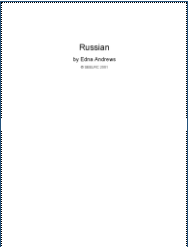 Andrews, Edna. Russian. SEELRC, 2001. http://www.seelrc.org:8080/grammar/mainframe.jsp?nLanguageID=6 Ebook!
Andrews, Edna. Russian. SEELRC, 2001. http://www.seelrc.org:8080/grammar/mainframe.jsp?nLanguageID=6 Ebook!
Watzke, John L, and James W. Sweigert. The Russian Reference Grammar: Core Grammar in Functional Context. Washington, DC: American Council of Teachers of Russian, 1997.
Beard, Robert. Russian: An Interactive Online Grammar. 1996. https://www.alphadictionary.com/rusgrammar/
.
Corpora
The Russian National Corpus contains over 300 million words from a variety of registers of modern written Russian, from fiction to newspapers, to scientific writing.
Other corpora:
- HANCO: The Helsinki Annotated Corpus
- OpenCorpora
- Computer Corpus of the Russian Language
- Spoken Corpora
- Corpus of Russian Student Texts
.



